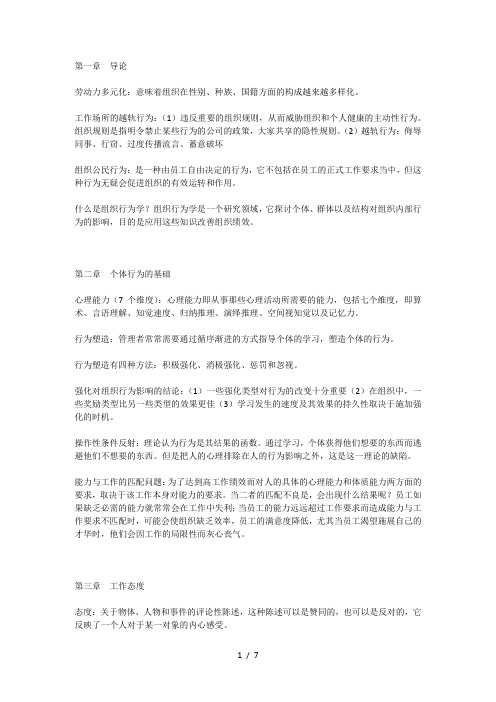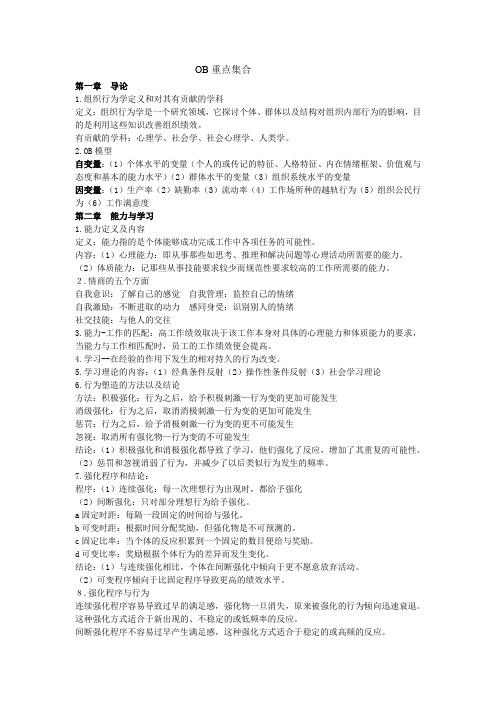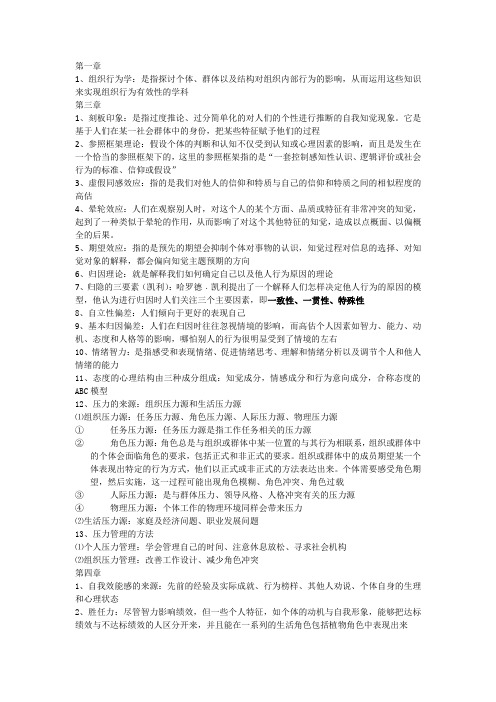组织行为学
- 格式:doc
- 大小:50.50 KB
- 文档页数:12

组织行为学的名词解释组织行为学(Organizational Behavior)是研究人们在组织中的行为模式和互动关系的学科,并通过理论和实践来推动组织效能和员工满意度的提升。
本文将深入解释组织行为学中的几个重要名词,包括组织结构、领导风格、团队文化和员工动机。
一、组织结构组织结构是组织中各个部门、岗位和个人之间的关系和权力分配的方式。
它可以分为垂直结构和水平结构,垂直结构包括有多少层级和权威的分配,而水平结构则决定了不同部门之间的沟通和协作方式。
组织结构的设计可以影响员工的工作效率、工作满意度和创造力。
一种常见的组织结构是分工明确的职权制,但也有其他形式的结构如矩阵式和平坦式等。
二、领导风格领导风格是指领导者在组织中对员工的行为和工作方式的影响方式。
研究发现,领导风格可以分为权威型、民主型和任务型领导风格等。
权威型领导者通常会直接下达指令,对员工进行严格管理和控制;民主型领导者更注重员工参与和协作的决策过程;而任务型领导者重视员工完成工作任务的效率和目标实现。
领导风格对员工的动机和满意度有着重要的影响,选择合适的领导风格可以激发员工的积极性和创造力。
三、团队文化团队文化是指在组织内部形成的共同的行为模式和价值观。
团队文化是由组织成员共同创造并共同遵守的,它可以在团队中起到凝聚力和推动力的作用。
团队文化可以分为理念型、支持型和创新型文化等。
理念型文化强调共享的价值和信仰;支持型文化注重员工支持和关怀的氛围;创新型文化鼓励员工的创新和实验。
团队文化对于员工的归属感和工作满意度有重要影响,良好的团队文化可以吸引和留住优秀的人才。
四、员工动机员工动机是指促使员工积极参与工作、努力工作的内在和外在因素。
传统的员工动机理论主要包括激励理论、期望理论和需要层次理论。
激励理论认为,员工的动机来自于激励因素,如奖励、晋升和工作环境等;期望理论则侧重于员工对于努力和绩效之间的期望关系;需要层次理论则认为员工有不同层次的需求,如生理需求、安全需求、社交需求、尊重需求和自我实现需求。

组织行为学名词解释1.人格(个性):指一个人区别于他人的、在不同环境中一惯、相对稳定的、影响人的外显和内隐行为模式的心理特征的总和。
2.个性心理特征:个性结构中最稳定的、经常表现出来的特征因素,是具有决定意义的成分,它表明一个人比较典型的心理活动和行为特征。
3.气质:是个人心理活动的动力特征,是指不以人的活动的动机、目的和内容为转移的、稳定的心理活动的动力特征(强度、速度、稳定性、灵活性)。
4.性格:是人在对现实的稳定的态度和习惯化了的行为方式中所表现出来的个性心理特征。
5.能力:是作为掌握和运用知识技能的条件并决定活动的效率的一种个性心理特征。
6.感觉:是人脑对作用于感觉器官的客观事物个别属性的反映。
7.知觉:是直接作用于感觉器官的客观事物的整体属性在人脑中的反映。
8.社会知觉:又称社会认知,即个体对他人、群体及自己的知觉。
对他人和群体的知觉是人际知觉,对自己的知觉是自我知觉。
9.印象:指存留在个体头脑中的认知客体的形象。
10.首因效应:最初出现的信息影响最大。
11.近因效应:最新获得的信息影响较大,因为它在时间上离认知者最近。
12.光环效应(晕轮效应):个体对认知对象的品质一旦形成某种倾向性印象,就会用它评价认知对象的其它品质。
13.刻版印象:人们通过自己的经验形成对某类人或某类事较为固定的看法。
14.定势效应:在人们头脑中存在关于某一类人的固定形象,当我们认知他人时,常有一种不自觉的准备状态,按其外部特征进行归类,从而产生出定势效应尤其是初见。
15.态度:是个体对所处环境中的人物、事情及其它客体所持有的一种具有持久性、一致性的内在心理和行为倾向。
16.正式群体:指那些由官方正式文件明文规定的群体。
17.非正式群体:指未经官方正式规定、自发形成的群体。
18.社会助长作用:也称社会促进,是指个体完成某种活动时,由于他人在场而提高了绩效的现象。
他人在场的形式有实际在场、隐含在场、想象在场。
19.社会抑制作用:指个体在与其他群体成员一起完成某种任务,或者有其他人在场时,会导致个体付出的劳动比单独时偏少,效率不如单独完成任务时高。

第一章导论劳动力多元化:意味着组织在性别、种族、国籍方面的构成越来越多样化。
工作场所的越轨行为:(1)违反重要的组织规则,从而威胁组织和个人健康的主动性行为。
组织规则是指明令禁止某些行为的公司的政策,大家共享的隐性规则。
(2)越轨行为:侮辱同事、行窃、过度传播流言、蓄意破坏组织公民行为:是一种由员工自由决定的行为,它不包括在员工的正式工作要求当中,但这种行为无疑会促进组织的有效运转和作用。
什么是组织行为学?组织行为学是一个研究领域,它探讨个体、群体以及结构对组织内部行为的影响,目的是应用这些知识改善组织绩效。
第二章个体行为的基础心理能力(7个维度):心理能力即从事那些心理活动所需要的能力,包括七个维度,即算术、言语理解、知觉速度、归纳推理、演绎推理、空间视知觉以及记忆力。
行为塑造:管理者常常需要通过循序渐进的方式指导个体的学习,塑造个体的行为。
行为塑造有四种方法:积极强化、消极强化、惩罚和忽视。
强化对组织行为影响的结论:(1)一些强化类型对行为的改变十分重要(2)在组织中,一些奖励类型比另一些类型的效果更佳(3)学习发生的速度及其效果的持久性取决于施加强化的时机。
操作性条件反射:理论认为行为是其结果的函数。
通过学习,个体获得他们想要的东西而逃避他们不想要的东西。
但是把人的心理排除在人的行为影响之外,这是这一理论的缺陷。
能力与工作的匹配问题:为了达到高工作绩效而对人的具体的心理能力和体质能力两方面的要求,取决于该工作本身对能力的要求。
当二者的匹配不良是,会出现什么结果呢?员工如果缺乏必需的能力就常常会在工作中失利;当员工的能力远远超过工作要求而造成能力与工作要求不匹配时,可能会使组织缺乏效率,员工的满意度降低,尤其当员工渴望施展自己的才华时,他们会因工作的局限性而灰心丧气。
第三章工作态度态度:关于物体、人物和事件的评论性陈述,这种陈述可以是赞同的,也可以是反对的,它反映了一个人对于某一对象的内心感受。

OB重点集合第一章导论1.组织行为学定义和对其有贡献的学科定义:组织行为学是一个研究领域,它探讨个体、群体以及结构对组织内部行为的影响,目的是利用这些知识改善组织绩效。
有贡献的学科:心理学、社会学、社会心理学、人类学。
2.OB模型自变量:(1)个体水平的变量(个人的或传记的特征、人格特征、内在情绪框架、价值观与态度和基本的能力水平)(2)群体水平的变量(3)组织系统水平的变量因变量:(1)生产率(2)缺勤率(3)流动率(4)工作场所种的越轨行为(5)组织公民行为(6)工作满意度第二章能力与学习1.能力定义及内容定义:能力指的是个体能够成功完成工作中各项任务的可能性。
内容:(1)心理能力:即从事那些如思考、推理和解决问题等心理活动所需要的能力。
(2)体质能力:记那些从事技能要求较少而规范性要求较高的工作所需要的能力。
2.情商的五个方面自我意识:了解自己的感觉自我管理:监控自己的情绪自我激励:不断进取的动力感同身受:识别别人的情绪社交技能:与他人的交往3.能力-工作的匹配:高工作绩效取决于该工作本身对具体的心理能力和体质能力的要求,当能力与工作相匹配时,员工的工作绩效便会提高。
4.学习--在经验的作用下发生的相对持久的行为改变。
5.学习理论的内容:(1)经典条件反射(2)操作性条件反射(3)社会学习理论6.行为塑造的方法以及结论方法:积极强化:行为之后,给予积极刺激—行为变的更加可能发生消级强化:行为之后,取消消极刺激—行为变的更加可能发生惩罚:行为之后,给予消极刺激—行为变的更不可能发生忽视:取消所有强化物—行为变的不可能发生结论:(1)积极强化和消极强化都导致了学习,他们强化了反应,增加了其重复的可能性。
(2)惩罚和忽视消弱了行为,并减少了以后类似行为发生的频率。
7.强化程序和结论:程序:(1)连续强化:每一次理想行为出现时,都给予强化(2)间断强化:只对部分理想行为给予强化。
a固定时距:每隔一段固定的时间给与强化。

一、什么是组织行为学?其有何特点?组织行为学是综合运用与人有关的各种知识,采用系统分析的方法,研究一定组织中人的行为规律,从而提高各级主管人员对人的行为的预测和引导能力,以便更有效地实现组织目标的一门学。
组织行为学的特点有三:1、边缘性、综合性。
组织行为学是一门多学科、多层次相互交叉和渗透的边缘性综合性学科。
2、两重性。
组织行为学又是一门具有两重性的学科。
它既有与组织中人的行为生物性特征相联系的反映人的行为一般规律的属性即自然属性,又具有反映人的社会活动规律的社会属性即阶级性.3、实用性。
组织行为学相对于心理学、社会学、人类学等学科来说,它是属于应用性科学.目的是紧密联系组织管理者的工作实际,提高他们的工作能力,改善组织的工作绩效.二、研究和应用组织行为学有何重要意义?有助于加强以人为中心的管理,充分调动人的积极性、主动性和创造性。
有助于知人善任,合理地使用人才。
有助于改善人际关系,增强群体的合理凝聚力和向心力。
有助于提高领导水平,改善领导者和被领导者的关系。
有助于组织变革和组织发展。
三、试述组织行为学的产生与发展过程。
组织行为学是在管理学特别是组织管理学和人事管理学的基础上产生和发展而来的,是管理科学的新发展。
1、由组织管理学到组织行为学:托马斯·彼得斯和罗伯特·小沃特曼在1982年出版的《寻求卓越的经营之道》一书中提出,组织管理学的发展经历了四个阶段,有四种类型:⑴20世纪初――30年代以泰罗、法约尔、韦伯为代表的科学管理学派,把组织看成一个封闭的系统,把组织中的人看作是理性的“经济人".⑵20世纪20年代――60年代以梅约、麦格雷戈、巴纳德、塞尔兹尼克为代表的行为学派,把组织看成一个封闭的社会性的模式,把人看成“社会人"。
⑶20世纪60年代――70年代以钱德勒、劳伦斯、洛希为代表的管理科学学派把组织看做是开放的理性模式.⑷20世纪70年代以后以维克、马奇为代表的综合性的现代管理学派,把组织看作一个开放的社会性模式,强调人是企业组织的中心。

第一章1、组织行为学:是指探讨个体、群体以及结构对组织内部行为的影响,从而运用这些知识来实现组织行为有效性的学科第三章1、刻板印象:是指过度推论、过分简单化的对人们的个性进行推断的自我知觉现象。
它是基于人们在某一社会群体中的身份,把某些特征赋予他们的过程2、参照框架理论:假设个体的判断和认知不仅受到认知或心理因素的影响,而且是发生在一个恰当的参照框架下的,这里的参照框架指的是“一套控制感知性认识、逻辑评价或社会行为的标准、信仰或假设”3、虚假同感效应:指的是我们对他人的信仰和特质与自己的信仰和特质之间的相似程度的高估4、晕轮效应:人们在观察别人时,对这个人的某个方面、品质或特征有非常冲突的知觉,起到了一种类似于晕轮的作用,从而影响了对这个其他特征的知觉,造成以点概面、以偏概全的后果。
5、期望效应:指的是预先的期望会抑制个体对事物的认识,知觉过程对信息的选择、对知觉对象的解释,都会偏向知觉主题预期的方向6、归因理论:就是解释我们如何确定自己以及他人行为原因的理论7、归隐的三要素(凯利):哈罗德﹒凯利提出了一个解释人们怎样决定他人行为的原因的模型,他认为进行归因时人们关注三个主要因素,即一致性、一贯性、特殊性8、自立性偏差:人们倾向于更好的表现自己9、基本归因偏差:人们在归因时往往忽视情境的影响,而高估个人因素如智力、能力、动机、态度和人格等的影响,哪怕别人的行为很明显受到了情境的左右10、情绪智力:是指感受和表现情绪、促进情绪思考、理解和情绪分析以及调节个人和他人情绪的能力11、态度的心理结构由三种成分组成:知觉成分,情感成分和行为意向成分,合称态度的ABC模型12、压力的来源:组织压力源和生活压力源⑴组织压力源:任务压力源、角色压力源、人际压力源、物理压力源① 任务压力源:任务压力源是指工作任务相关的压力源② 角色压力源:角色总是与组织或群体中某一位置的与其行为相联系,组织或群体中的个体会面临角色的要求,包括正式和非正式的要求。
第一节组织行为学的概念、研究内容与研究方法一、什么是组织行为学组织行为学是研究在组织系统内,个体、群体及结构对组织内人的行为的影响,以提高组织绩效为目的的一门科学。
组织行为学可以作以下表述:组织行为学是一个研究领域,具有综合性、应用性的学科特点。
组织行为学研究范围------ 定位于组织系统。
组织行为学研究的重点--------组织中的行为特征及其规律性。
组织行为学研究的目的---------提高组织运行的有效性,即组织行为学的自变量可以理解为个体行为,群体行为,组织行为。
而组织行为学的因变量可以包括生产效率、工作的满意度、工作的流动性、缺勤情况等四项因素。
二、组织行为学研究的主要内容1 个体行为个体是组成组织的基本单元和细胞,直接影响组织的整体素质。
人的行为存在着共性与特殊性。
对“共性”的研究是组织决策重要的依据条件。
对“特殊性”的研究,如人的能力,气质,知觉与态度,乃至价值观等差异的研究,有助于更好地运用激励机制,合理运用人力资源和开发人的潜能,提高组织的效率。
美国学者霍夫斯德(Greet Hotstede)认为,人的个性受到态度、价值观、文化差异的巨大影响,表现为四个维度:(1个人主义/集体主义:前者强调以个人为核心,趋向建立松散的社会结构(如美、英、荷兰等),后者强调集体为核(2心,趋向建立紧密型的社会机构(如诸多亚洲国家)。
(3权力距离:表现为人们权力、权威、尊敬和崇拜的程度。
权力距离大的社会,人群表现为组织内权力差异的认可以及对权威的尊重。
反之,则表现为上下级之间更多的平等。
(4确定性规避:表现为社会人群对社会前景的估计以及对待风险和安全感的态度。
高不确定规避的社会,其成员常表现为不安,并能对风险泰然处之(如瑞士、北欧等国生活数量与生活质量:前者强调自信和物质主义(如日本、美国),后者强调人与人之间关系的和谐与相互关心(如北欧国家)。
2群体行为群体是指个人的集合。
表现为三个特征:(1群体是一群人的集合。
It looks same emotion and mood, in fact the two are different. Emotion is a general term, includes all people experience the feelings. And emotions, it is a kind of strong feelings, he directly to people and objects. Relatively, a lot of intensity is weak state of mind, he is a weaker than emotions and often lack emotional background stimulation. Tell from the category, emotional include mood and state of mind, and can be experienced in the form of emotions and mood. Meticulous, emotions caused by the specific things, generally shorter, he essentially is concrete, and the action of performance, quantity many, also often accompanied by facial expression. The interpretation of the mood looks more macroscopic than emotions. He is often the cause of the general, not clear, sustained time is longer than the mood, is more general, there will be no significant expression revealed, in essence is a cognitive.Now let us more detailed understanding of emotion and mood in turn. There are as many as a dozen emotions, such as anger and contempt, enthusiasm, envy, fear, frustration, disappointment, disgust, embarrassment, joy, hate, hope, jealousy, joy, love, pride, surprise. So many emotions may separate meaningless, however, these feelings completely can be divided into six categories: anger, fear, sadness, joy, disgust, surprise. Some researchers even willthey fall into a continuum: happiness, surprise, fear, sadness, anger, disgust.Mood disorders is a very complex phenomenon, for a long time, scholars from various fields from their own discipline, phenomenon have made their own explanation, biologists are now involved in this problem, and discussed from the Angle of biology, they let a person find everything new and fresh ideas. We often say that people's moods, in fact, we often is not the real owner of their emotions. In the body, there are many chemicals control our emotions, our joys and sorrows under their control. For example, sometimes we will somehow upset, investigate its reason is a hormone called \"mela much better\" in the work: if the secretion of the hormone, can lead to mood be agitated, depressed, etc. According to research, Melanie more ning is also lead to a disease called \"winter blues\". The disease, especially the haze, the lack of sunlight in winter days, easily depressed, unhappy, even to the extreme behavior. Why some people so happy, life is admirable? It involves a chemical called \"dopamine\". Neurons is dopamine neurons in the conduction of a chemical that when dopamine transmission is smooth, the brain can produce a series of chemical change, make us pleasure.Emotions is to adapt to the survival of psychological tool is the product of evolution. In the lower animals species, all mood some behavior reaction model of adaptation value only. When the specific patterns of behavior and physical arousal and the corresponding state of feeling, have the mood of adaptability, its role is to launch the body's energy to make the body in a state of appropriate activities. So the mood since the date of produce becomes d ` learn education network collection in order to adapt to the survival of the tool. Inherit and develop the human animal emotions this advanced adaptive method. The mood adaptation function is to improve and perfect the people's survival and living conditions. Because people live in the society with high cultural and emotional adjustment function of the form has changed a lot, be friendly to each other with a smile, through empathy and compassion to maintain personal, emotional affinity to promote social role, but the antagonism with great damage.Mood of psychological activity and behavior motivation can urge reaction of organism, engaged in activities. In the field of the most widely for the activities of human motivation: the mood of this motive function is embodied in the physiological activity, but also in the cognitive activities of people. Physiological drive behavior motivation is activated organisms. While the role of emotions isable to enlarge the displacement d ` infomation collect force signal. Thus more strongly stimulate action. Emotional reactions are more flexible than drive, it can not only according to the needs of the subjective and objective to react in a timely manner, and independence from drive to starter.Emotions are the organizers of the psychological activity is independent of mental process, has its own mechanism and operation rules. As a monitoring system in the brain, emotional effect on psychological activity with other organizations. Emotional organization include two aspects for the promotion of activities or disintegration, positive emotion plays a role of coordination, organization, negative emotions disrupt, dismantle or blocking effect. Research proves that emotions can affect the effect of cognitive operation, effect depends on the nature of the emotions and intensity.Emotions is an important means of interpersonal communication and language, has the function of serving the interpersonal communication. Emotions through a unique means of communication, namely expression to realize information transfer and mutual understanding among people: the facial expression is the most important medium of information. Facial signal transmission not only serves the interpersonal communication, andoften become the media, people know the things the mood reference role to help people's social adaptation. Emotional communication function is embodied in the form of interpersonal emotional connection. Such as attachment, friendship, affection, and love is feelings for medical ` learn education network collect the link of the connection mode. Mood of organization, is in terms of impact on memory and behavior. Good mood state, easy to recall with a happy mood colorific materials; If the memorization material under a certain emotional state is memory, so under the same emotional state, these materials are more likely to be recalled. When people in a positive and optimistic mood state, tend to pay attention to the bright side of things, and make the person produces the negative emotional state pessimistic consciousness, lose hope and desire, are more likely to have aggressive behavior.Emotions have close relationship with health through nerve, endocrine and the immune system caused by physiological changes affect health, serious when can also cause the disease. Optimism is good for health and longevity, and serious negative emotional state itself is a kind of unhealthy.State of mind, including positive affection and negative affection, positive emotion is a dimension of mood, is made up of positive emotions. Negative emotions as another dimension of mood, byhigh tension, stress and anxiety and the relaxation of the low-end of peace and quiet. Emotions and mood have a variety of sources, such as: personality, weekly and daily time, including good morning and good night, the weather, unreal, pressure, social activities, sleep and exercise.Have you ever said, "today I got up from the other side of the bed." You have no reason to a colleague or family mad? If you have, where you would like to know the mood and state of mind from. Here, once again, we will discuss the state of mind, even if the mood state of mind are more easily affected by the event. Irony is that the researchers on the research of the source of mind than the study of source of specific emotions. So, now we turn to the main source of mood, but these will affect the mood.Positive events are more likely to affect the outgoing people a positive state of mind and positive emotions. Negative events are more likely to affect low emotional stability of negative mood and negative emotions. To illustrate, we work together with two friends - Paul and alex, for example. Paul in two dimension scores high extroversion and emotional stability, alex both score is very low. One day, Paul and alex learn they will get the sales commission, this is their work team's achievements. Later in the day, their boss dropped in to see them, and there is no reason to shout at them. Inthis case, you can predict that the increase of Paul's positive emotions than alex, because Paul is more outgoing, more immersed in the good news of the day. Instead, you can predict alex, the increase of negative emotion is higher than Paul, because alex the emotional stability of low score, so tend to indulge in the negative events of the day.Weekly and daily time Monday to Friday, most people are at work or at school. For most people, this means that the weekend was the day of relaxation and leisure. This suggests that people state of mind at the end of the week is best? This is indeed the case. As shown in figure 8-3, in the first few days of the week, people's state of mind is the worst (maximum negative emotion and the lowest positive feelings), behind a few days the mood is one of the best (the highest and the lowest positive affect negative emotions). In a day? What time do you usually the best state of mind? When the worst? We often think that "good morning" or "good night" type of people is different. However, the vast majority of people is similar to the laws of the county. Early in the morning, people's state of mind is generally low. During the day, our mood will improve, at night and will decline. It is interesting to note that whenever people sleep, when waking up, positive emotions will peak in the middle ofthe waking and sleeping this time o 'clock. Negative emotions in one day, however, there is little volatility.What's the meaning for organisational behaviour? Get help on a Monday morning or delivering bad news does not seem to be the right thing to do. Our work interaction at noon and after a week later will be more positive.People describe themselves as "good morning" is not necessarily more alert when I was in the morning. However, these "good morning" people experience mood (emotional) than those who calls himself a "good night" good (positive) a little.When do you think your mood will be better weather? Temperature of 70 degrees of sunny or cloudy, cold and rainy day? Many people think that their mood is related to the weather. However, there is evidence that has little effect on the state of mind. One expert pointed out: "contrary to popular culture consensus view, clear sunny days will not make people's mood better (on the contrary, the gloomy rainy day will not make people's mood worse)." Unreal fantasy related (inusory correlation) may explain why people would think the good weather will improve their state of mind. When people associate and no real can appear when two events linked to the unreal.As you can imagine, pressure affect mood and mind. For example, the degree of fear before the exam, the students will be higher, but, once the exam was over, they fear will go away. Work, the pressure of daily events (malicious email, the deadline of the adjacent, bulk sales loss, being reprimanded by the boss, etc.) will bring negative influence employee's state of mind. The influence of the pressure over time. As the author of a study said: "with the passage of time, the frequent events of the low pressure may cause stress levels of employees gradually strengthened." Increasing work pressure and tension can make our mood worse, we will have more negative emotions. See an employee blog: "it feels a bit boring... physically, I feel scared, outside of the weather and bad mood - samples, also need to complete the work is gradually increasing." Although sometimes pressure will make us energetic, for most people, the pressure began to undermine our state of mind.Social activities have a picnic with friends or family birthday is your happiest time? For most people, the social activities can increase the positive state of mind, and the negative mood almost had no effect. But, it is in a state of mind of people willing to take an active part in social activities, or social activities bring good mood? Seems to be both convinced of. The type of social activities have affected?In fact there is. Research shows that the body, skating or hiking with friends) and informal (party) or food (dinner) with others activities, than formal (the meeting) or sedentary activities (with friends watch TV together), can increase more positive state of mind.For the interpretation of the mood also includes emotional labor, is refers to the employees at work and interpersonal communication process of 2 groups showed satisfying emotion. Emotional disorders, refers to the at the same time, employees emotions and he is really different feelings. Humans have emotions naturally also want to learn to control your emotions, the so-called emotional intelligence is my door at ordinary times of emotional intelligence, emotional intelligence is a kind of self emotional control ability index, by the American psychologist Peter salovey was founded in 1991, belong to the category of developmental psychology. Emotional intelligence is a kind of knowledge, understanding and ability to control emotions. But others question whether emotional intelligence is a kind of intellectual ability of extension. IQ, eq, which is the basis of human how to better adapt to social and environmental. A person's intelligence quotient (IQ) : generally it is relatively stable, although can be developed, but not too many changes. But our emotional intelligence is different, when weexperience a lot of life experience, emotion course, stimulation and so on, our eq will be increased. So a mature person, their emotional intelligence is much better than the an immature peopleAs we all know, a person's IQ, can decide our achievements. Einstein's IQ is 175, so he is one of the greatest physicists. But do you know, a person's emotional intelligence, can decide our achievements. Emotional intelligence (that quotient abbreviated as EQ) is said to know and control and the ability to adjust their own emotions. High and low eq reflect the emotion quality difference. Emotional intelligence for a man's success plays a more important role than IQ.Emotional intelligence is mainly related to irrational factors, which influence the power of understanding and practice activities. It by influencing people's interests, will, perseverance, strengthen or weakening know something the driving force. IQ is not high and high eq, learning efficiency and less intelligent, but sometimes can do better than a high IQ, a greater achievement. Because the spirit of perseverance makes frequently compensated. In addition, emotional intelligence is a self and other emotional grasp and adjust ability, therefore, have great relations handling of interpersonal relationship. Its role and social life, relationships, health, marital status, there is a close correlationPeople with low eq interpersonal tension, easily broken marriage, leadership level is not high. And high eq, usually have a healthy emotion, has the perfect marriage and family, have a good interpersonal relationship, easy to be a department leader, has higher leadership and management ability.Emotion and mood are widely used in organizational behavior, such as: selection and decision making. Creativity, motivation, leadership, interpersonal conflict, negotiation, customer service, work attitude, deviant behavior in the workplace, and the tendency to managers how to choose a positive state of mind of team members, and so on.。